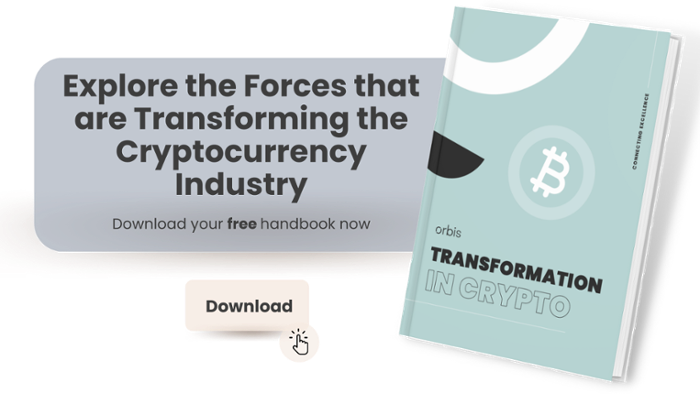-1.png)
4-minute read - enough time to switch off from work and enjoy half your lunch 🥗
Cryptocurrency is thought of by some as the key to putting power and wealth back into the hands of citizens, loosening the hold of governments and banking institutions.
Many are cautious of this idea, due to the potential volatility of cryptocurrency, its association with cybercrime and the dark web, and its climate impacts. Others, however, believe that crypto has the power to correct global inequity and support disadvantaged people.
Crypto is by no means proven to be unreliable, and it is regulated around the world, with new mandates rapidly coming into play.
In the US, crypto exchanges fall under the Bank Secrecy Act, requiring records to be submitted to the authorities. Securities laws are also applied to digital wallets and exchanges.
In Japan, crypto is treated as property and must be registered with the Financial Services Agency, while in China, it is entirely illegal. In the UK, registration is required with the FCA.
The only countries where cryptocurrency currently holds legal tender status are El Salvador and the Central African Republic.
As the World Economic Forum put it, the crypto economy could create ‘an alternative financial and technological infrastructure that is global, open-source, and accessible to all who have access to the internet, regardless of nationality, ethnicity, race, gender, and socioeconomic class.’
Let’s explore some ways this could be achieved, and address the question:
Can crypto really fix financial inequity?
Financial inclusion for the unbanked.
There are 1.7 billion unbanked people in the world.
Crypto, especially the leading Bitcoin, can act as a quasi-bank which is more accessible to those people, as it does not require users to jump through the same financial hoops as traditional bank accounts.
According to Nigel Green of DeVere group, quoted by CityAM, cryptocurrency can “bolster financial inclusion for individuals and businesses” in lower-income and developing countries, by circumnavigating the biases of traditional banking.
This could allow for a more even spread of wealth regionally and globally, overcoming historic disparities which make it easy for wealth to pile up in some locations while remaining nearly impossible to come by in others.
A universal currency.
Bitcoin is ‘universal’, meaning its value does not change from one location to the next, like exchange rates which apply to traditional currency. Nor does it cost anything to send Crypto from one place and ‘withdraw’ it in another.
According to the Centre for Financial Inclusion, Cryptocurrency’s ‘greatest benefit is in significantly decreasing the cost of sending remittances to friends and family. Bitcoin transactions are free, meaning remittance senders do not incur significant money transmitter fees.’
Moreover, since crypto is decentralized, it is not subject to capital flow restrictions (regulations on the movement of money across borders). This means that there is now a way to get that capital into regions where it’s needed in the first place.
Whether wealth is being exchanged between family members, or on a larger scale between nations, could this have the potential to equalise global wealth divides?
An antidote to unreliable infrastructure.
Traditional, centralized banking puts control of policy in the hands of a few institutions. When this goes wrong, the impacts can be both severe and widespread. Examples include the Great Depression and the 2008 financial crisis.
Investopedia stated that ‘Bitcoin has the potential to dismantle a banking system in which central authority is responsible for decisions that affect the economic fortunes of entire countries.’
Of course, there is an opposing argument: Banks employ, stabilise and safeguard during crises, while Bitcoin has a limited supply and lacks legal tender status in most countries.
While many would argue that crypto is not yet ready to replace traditional financial infrastructure, it may be a safer way for people living in unstable economies to store wealth.
Better stability for poorer economies.
So, if crypto offers stability, can it do so for whole developing countries and low-income economies?
According to CityAM, Nigel Green of DeVere group stated that “Low-income countries have long suffered because their currencies are weak and extremely vulnerable to market changes” which “triggers rampant inflation.” Therefore, most rely on ‘first world’ tender like the Dollar or GBP.
By making crypto their legal tender, such countries can create an economy less influenced by market conditions or other currencies.
Additionally, Crypto may be an effective way to protect against the major issue of inflation in developing nations.
As the Guardian Nigeria stated, ‘Inflation causes the value of commodities to increase in these countries. What’s more, the poor’s cash in their bank accounts loses its value.’
In this case, Bitcoin’s finite supply is a solution; it makes inflation impossible, and the value of this currency only increases with demand.
In these ways, crypto could provide a ‘pot’ of money that’s immune to the common risks and challenges that apply to cash and regular banking.
Finally, it’s impossible to predict whether any cryptocurrency can really ‘fix’ the problem of global inequity.
However, what does seem clear is that this innovative form of money has highlighted the flaws and drawbacks of the traditional kind. There’s hope that the power of crypto will bring about progress in terms of financial inclusion worldwide.



